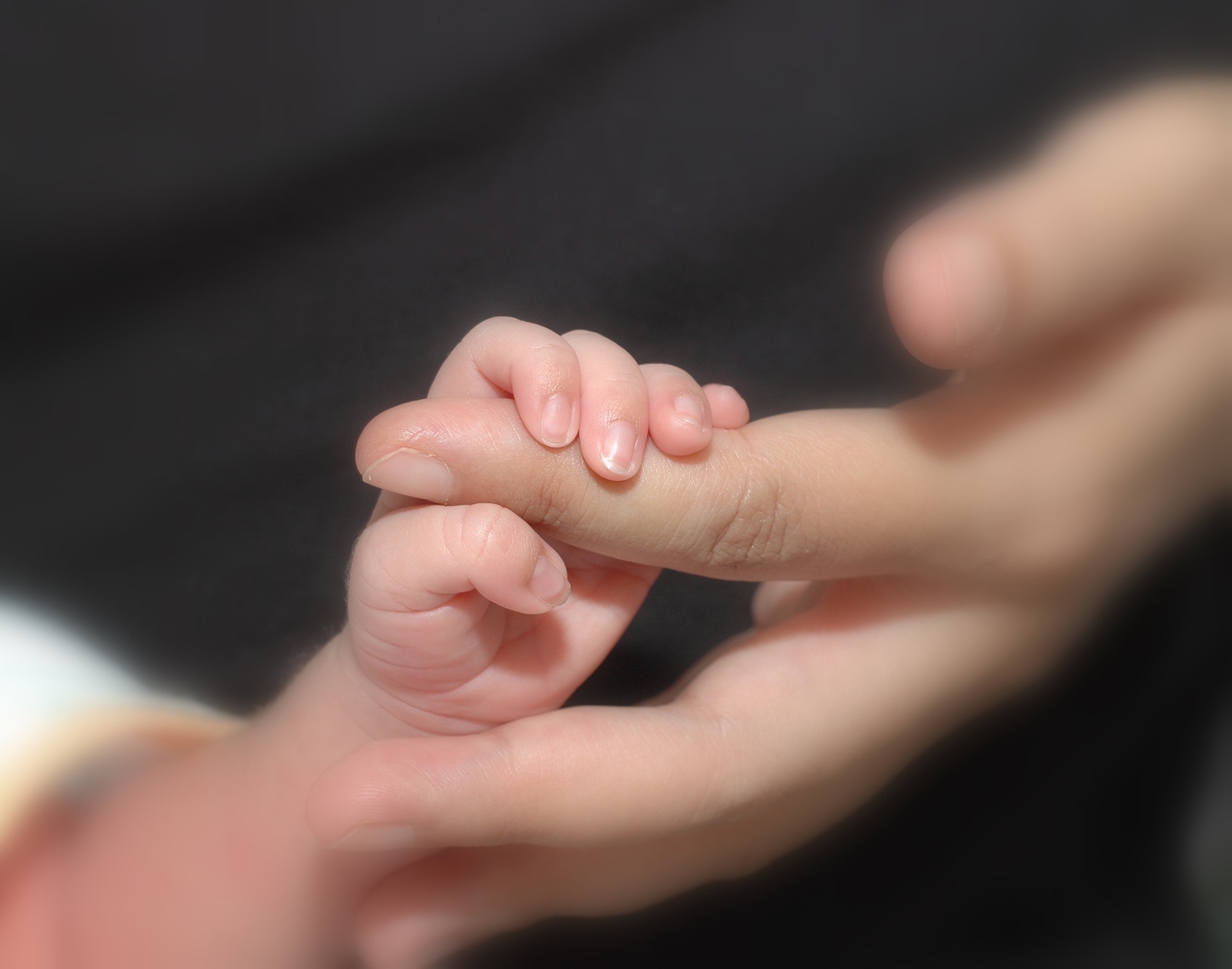
by Kate Downing | May 17, 2016
I have been asked by different people if I might be interested in blogging about my experience as a foster mom, and I have always been interested but just really didn’t know if I would have the time. With that said, I still don’t know that I have time, but with it being National Foster Care Month, I was reminded recently that I do have time to at least write some of my thoughts down and see where it goes.
As I got the kids dressed recently, I pulled out this onesie for my 6-month-old. I bought it a few weeks back and really had forgotten it was in the drawer, but as soon as I saw it, I knew she needed to wear it. “Born to be loved”. The number-one thing I hear from people when they find out that I am foster mom is, “I just don’t know how you do it. It would be too hard to give them back.” I used to just smile and say, “Thank you,” but then I feel like the Lord gave me a clear response to say back to them. I do my best to respond with love, and hopefully, part of my explanation and encouragement might get them involved in some way as well.
As a 40-year-old (ugh), single woman, I do not think I would be shocking anyone if I told you that I have had some heartache in my life. I’d like to say that I have been in love, but somehow in this earthly world we live in, I think our view of what real love is can get very distorted and hide itself in what our human brains think is love or feels like it at some point in our lives. I do know that my heart has been broken, and I desire to have someone love me unconditionally and be my partner for the rest of my life; someone to do life with, as some say. Heartbreak hurts, and those have been some of the darkest times in my life, but through each experience, I feel that the Lord has taught me more and more what real love should look like and has given me the desire to keep searching for it until it looks more and more like Him, and each time my heart has eventually been healed.
I have now had the privilege of fostering three babies. The first baby I fostered went home to his birth mom after he had been with me for about eight months. I had witnessed so many “firsts” for him – first time he sat up, first time he ate baby food, first time he took steps, his first words. I cannot really describe what it felt like that first night when I knew he was not sleeping in his crib in the other room. This was not a first I wanted to remember like the rest of them. I mourned that loss for months, but thankfully, was able to continue a relationship with his family, which is really one of the ultimate goals of fostering known as bridging.
It was through this time that the Lord showed me that although this is probably the hardest thing I have been through, my heart can mend, and I can slowly find restoration through Him, but these babies have no comprehension of this. They were born to simply be loved, and it is my responsibility to show them the love they so richly deserve.
Because of what Christ did for me, I know what true sacrificial love is, and fostering gives me the opportunity to love just like He did (or as closely as I can). How could I possibly not love these babies as they need, even if it is only for a period of time? Although, it has also taken me months to really be able to say this, it is also my responsibility to love their families that way, too. I know from personal experience this is not the easiest thing to do because often times we might not agree on some things — well, a lot of things — but I still have to look for opportunities to be Jesus to them, too.
So when that hard question comes, my response now is something to the effect of, “I am just loving on them the most I can for now and the time He has given them to me, and I trust that the Lord will heal my heart if that time comes for them to go home, but I’m not missing this opportunity He has given me to show His love to them and their families.”
Now don’t get me wrong. I know not all are called to foster, but there are so many other ways you can also show this love to the more than 11,000 children in our state alone who are in the foster care system. Thankfully, we have had an enormous amount of support shown to us these past three years through showers, meals, gift cards, hugs, time spent, listening ears… just to name a few.
I would encourage you to give it some thought, pray about it and really seek what He might be asking you to do with this information I have given you today. I am more than willing to talk to you about the process I went through and answer any questions you might have. I would love to tell you about Anna’s House, the organization of which God connected me that supported me through this whole process and provides for our family in so many ways.
EDITOR’S NOTE: May is National Foster Care Month. Those interested in more information on foster care and Oklahoma Baptist Homes for Children’s newly-founded “One Such Child” program visit http://www.obhc.org/foster-care or contact Teri Blanton, OBHC foster care coordinator at (405) 640-0622.

by admin | May 12, 2016
On May 4th, Secretary of State John Kerry – while giving remarks alongside EU High Representative Federica Mogherini – reminded the Assad regime in Syria of their commitment to allow humanitarian aid.
“To date, the regime has consciously and unacceptably blocked food and medical supplies from getting to people in desperate need,” said Secretary Kerry, “and I think it is clear that humanitarian organizations must be allowed access to serve the people who are in need.”
These remarks come on the heels of a horrific attack on an al-Quds hospital in Aleppo, Syria. Doctors, children, patients and medical personnel were killed as explosions turned the hospital, a symbol of hope, into a mound of rubble that looks all too familiar and is associated only with pain.
Oklahoma is a land which has seen its fair share of heart-wrenching disasters – some caused by nature and some by man. While we are privileged to have been spared from an attack by our own government such as this in Aleppo, we are no stranger to terror. Heartbreaking visuals of Syrian men carrying children from rubble remind us of events still fresh in our minds, but in every disaster we face, Oklahomans are quick to respond and give relief where needed.
Where faithful men and women in yellow caps alongside other civilian helping-hands descend on disasters in Oklahoma (and around the world), there is a group of individuals found in white helmets who respond after government air strikes and bombings in Syria. Described on the website as “bakers, tailors, engineers, pharmacists, painters, carpenters, students and many more,” the White Helmets are men and women committed to responding in crisis.
We are so often beleaguered by news of terror and war abroad that we become unintentionally desensitized to the fact that lost men, women, and children are dying without hearing the Good News. I am thankful for the work of our Disaster Relief volunteers and that they faithfully share the Gospel with those whom they help; I am burdened by how easy it is to distance ourselves from the Middle East and those who will not hear the Gospel before the next government air strike.
“What can we do?” you ask. Pray for strength for the White Helmets as they will inevitably face greater distress and terror. Pray that the Father impresses upon the heart of Bashar al-Assad, President of Syria, to allow humanitarian aid to his citizens. Pray that Christians in this area are given endless opportunities to share the Gospel and that the hearts of many will be softened and that they would believe.
Sometimes it feels like we can only do so much, and perhaps in tangible ways we are limited, but we must understand that such tangible aid is that which is limited; the ability to approach our Heavenly Father and intercede on behalf of those on the other side of the globe will render a much more lasting effect.
For more information on The White Helmets, visit www.whitehelmets.org.

by Brian Hobbs | Apr 14, 2016
What does the date April 15 bring to mind? For most, April 15 means tax day, the day on which our tax filings are due (though this year I am told April 18 is tax day).
History buffs, though, may recognize it as the date on which the Titanic sunk (April 15, 1912). If you have seen the Leonardo DiCaprio film Titanic, you might be led to think that many of the men on the ill-fated boat were selfish losers who tried to save their own skin.
History records show, to the contrary, that of those who perished in the tragic sinking of the Titanic, 80 percent of men died, while 25 percent of women died. “Women and children first,” was largely the mode of thinking in this age.
There was one man, however, who took it a step further. John Harper, a committed Christian believer with a zeal for evangelism and burden for lost souls separated from God also was on that boat. As the great vessel began to sink beneath the icy waters, he shouted “Let the women, children and the unsaved into the lifeboats!”
His story is recounted in a book titled “The One Year Book of Christian History,” which gives great examples of the people of God doing mighty things because of God.
Harper, years before the Titanic’s voyage, nearly drowned on another ocean vessel. Surviving the experience, he said, “The fear of death did not for one minute disturb me. I believed that sudden death would be sudden glory.”
That same confidence in Christ shone through on the fateful night of the Titanic’s sinking. One survivor shared that prior to slipping beneath the waters to his death, Harper shared the Gospel with him. “Believe on the Lord Jesus Christ and thou shalt be saved,” said Harper, citing the book of Acts.
The man who heard the Gospel was picked up by a lifeboat and was rescued. Because of Harper, he repented from his sins and believed in the Gospel of the Lord Jesus Christ and was eternally rescued, saved unto eternal life.
When I compare Harper’s commitment to evangelism to that of mine, I am ashamed. In my worst moments, I am waiting for perfect conditions, for just the right moment, before I step out to share the words of life.
Harper, meanwhile, in life and in his death shared without ceasing and proved that God can use moments of disaster and desperation for his glory, if we will just be available.

by Brian Hobbs | Mar 9, 2016
Get this. “Currently, more than 11,000 Oklahoma children are in the custody of DHS and in need of out-of-home placement.” That is an eye-popping number, but those are not just statistics—they are real children, boys and girls.
Last November, the leader of Oklahoma Baptists, Dr. Anthony L. Jordan, delivered a powerful sermon at the Annual Meeting, calling on Southern Baptists in Oklahoma to meet the growing foster care need.
Dr. Jordan announced that the Baptist General Convention of Oklahoma would be teaming up with Oklahoma Baptist Homes for Children (OBHC), to equip churches to take an active role in foster care.
In the weeks and months since, OBHC has launched the “One Such Child” program, to do just that.
On the Baptist Messenger’s podcast, I was able to interview OBHC president-elect Greg McNeece and OBHC foster care coordinator Teri Blanton about how the local church can get involved in foster care.
Listen to the interview here, and think about what God is calling you to do on this key issue.

by Caleb Moore | Jan 13, 2016
I recently heard Bible scholar Dr. Michael Heisner say that when Paul went into a town he searched two places, the synagogue and the jail. He did this because he knew he would start at one and end up in the other. Paul knew just how confrontational the message of the cross would be.
There is a popular phrase that circulates around churches that says you may be the only Bible someone ever reads. Meaning, your life should reflect the Gospel to others. However, people are not going to come to faith by osmosis, simply because you were kind to them or gave the homeless guy by your office your jacket. Without a doubt, these are Godly actions, but they are not the full Gospel.
I see in scripture that Jesus commanded his disciples to go out, two by two and call people to repentance. He then told them that if the people do not want to hear it, shake the dirt off of your sandals at their doorstep and go somewhere else. I personally cannot think of anything more confrontational then calling someone to repentance. It can feel like a dagger of betrayal or hate speech to the person on the receiving end. But the call to repentance is the message that Jesus sends his disciples out to teach.
We see very little of this from the pulpit or personal interactions with Christians today. I have had many neighbors that I had hoped would come to Jesus simply because they knew I was a Christian and that I was a nice guy. I regret the fact that I have moved, never knowing whether or not they were saved simply because I didn’t have the courage to ask. Often times we confuse our morality with the Gospel. We assume that by living a good life others are going to be attracted to that, and we hope they will ask us first so we can gladly proclaim the Gospel. It’s wonderful when this happens, but we must never forget that morality is not the Gospel. Repentant faith in Jesus as Lord and God is the Gospel. That is why confrontation is so important.
Confrontation brings clarity to ambiguous spiritual talk. Relational ministry is important, but we should never sacrifice the Gospel for the sake of ministry. If you have read this far, you might be squirming a bit in your seat because we have been engrained with the idea that we should avoid confrontations at all cost. The term brings up visions of mean Bible thumpers or nuns with a ruler ready to slap our hands. But confrontation is necessary anytime truth is being discussed.
Truth by very definition separates itself from lies. That is why when Jesus sends out the disciples he instructs them to call people to repentance. He does not tell them to go and make friends for a few years and hope someone asks them about the bumper sticker on the back of their camel. He tells them to go and confront sinful people with their sinfulness. Confrontation can be done in such a way that it doesn’t come across as hateful. Think of the story of Jesus meeting the woman at the well. He is kind but also very confrontational. He mentions that she has had many husbands and is currently with a man she isn’t married to. We know from the context that she came to the well at that time most likely to avoid the very type of conversation Jesus intended to have. We can imagine that she had been confronted before by family and friends about her lifestyle.
Just from my own experience there were times before I was saved that simply waking up and looking in the mirror I was confronted with the reality of my sinfulness. But Jesus did not just confront her illness; he treated her spiritual sickness. A doctor always has to diagnose the problem before he can prescribe a cure.
If we are going to make any attempt at following the example of Jesus and the disciples then confrontation must be a part of that. It is a necessary act of love that is uncomfortable for many. And it should be uncomfortable, to a degree, because we are laying out the sinfulness that a person already knows they have deep down in their heart. But we are not laying it bare, so that we can mock them, we expose the wounds so that we may treat them.
So, have you ever actually asked your neighbors, “Do you know Jesus and have you repented of sins and made him Lord?” Without godly boldness and loving confrontation, we do not give the Gospel the clarity it deserves.

by James Hunt | Nov 23, 2015
He sat there shaking violently, the effect of two weeks straight binging on drugs. “I’m going to die,” he later said reflecting on the fear going through his mind during that occasion. Of course this wasn’t the first he’d been strung out on drugs – such had been his pattern ever since he dropped out of high school and lost his spot on the baseball team.
He was a druggie! Anything he could get his hands on he’d take. Once laid up in a hospital bed next to his friend, both overdosed but survivors, now he sat alone, just he and his dad outside the funeral home. Inside his cousin lay dead of an overdose from days earlier.
I loved this young man now in his late teens. I’ve known him since he was just a cute, bushy-headed toddler. But here he sat in the car with the window rolled down shaking violently.
“I’m scared! My insides are raging. I don’t know what to do!” he repeatedly said.
We prayed. “God, you are not the author of fear, but of power, love, and a sound mind. You have come to set captives free. Set Zac free, dear Lord. Give him life, save him.”
God answered our prayers that day. At least regarding physical life. I’ll never forget sitting across the table from him at IHOP late into the evening in the early morning hours, with him still under the effects of being stoned off his gourd for weeks straight.
But I learned something that night. God has the ability to even work in the heart of someone strung out on drugs. Zac prayed trusting in Jesus as Lord and Savior. What a blessing to witness this new birth!
Zac had quite a journey to walk before he was totally free. He agreed to go to a Christ-centered, biblically-saturated men’s recovery home in Southwestern Oklahoma. His first attempt there ended in disgrace, and he was asked to leave.
For a few months he went back to his old life – going even further into darkness. Living in houses that had no utilities, without work, drugging it up again. I met him one day and took him to Cattlemen’s restaurant. We talked. I listened. He listened, as much as he was able to, as I reminded him of God’s grace as well as God’s right to rule over his life. I dropped him back off at the house where he was staying, after stopping by the grocery store for bottled water. “No running water,” Zac informed me.
And then it happened. God got Zac’s attention by letting him get caught. After a month or so in the OKC detention center Zac got permission to return to the residential home he’d been asked to leave. This time he made it with great success and much grace!
Fast forward to the present: I sat in my office at home opening up an email with an attachment. It was an assigned paper in fulfillment of a class requirement at Leavell College (The college at New Orleans Baptist Theological Seminary).
The Gospel as Eyewitness Testimony and the Development of Early Christology
Then it hit me – I was being asked to review a doctrinal paper excellently written by a former druggie named Zac. Now a fully devoted disciple of the Lord Jesus and pursuing a call to ministry, he was reaching out to me for affirmation and feedback on a theological paper. I bowed in thanks to the One who sets people free in Jesus. Praise the Lord for His grace.






